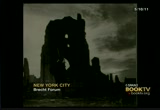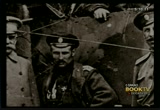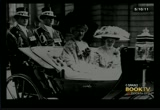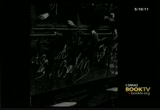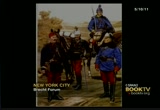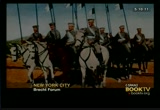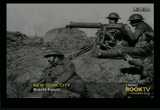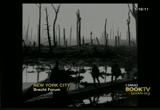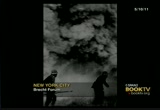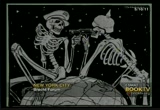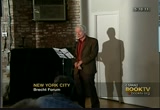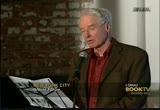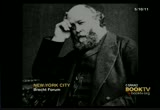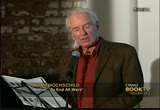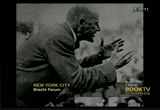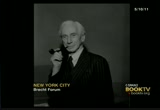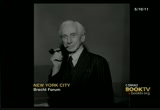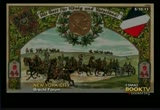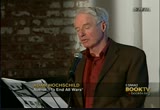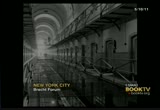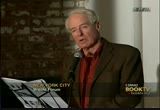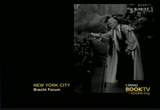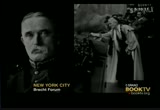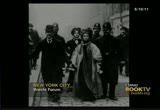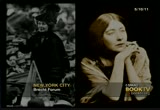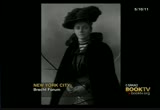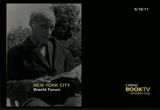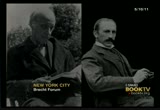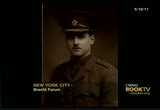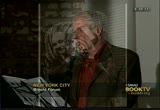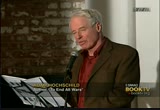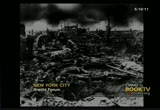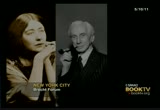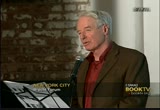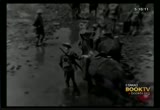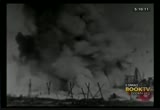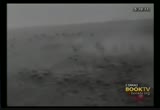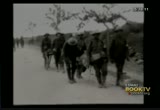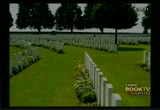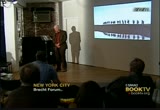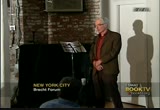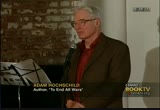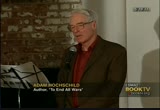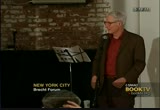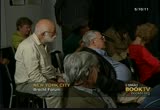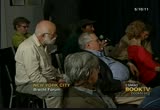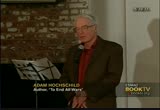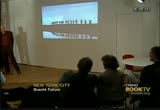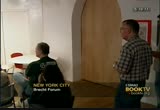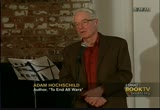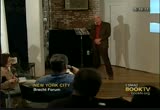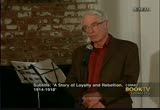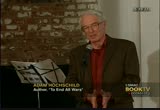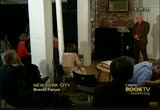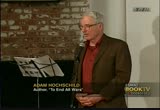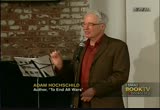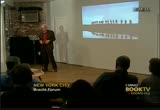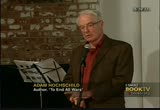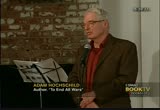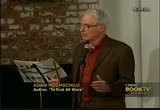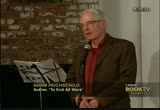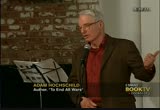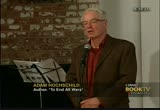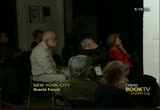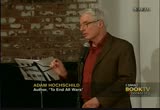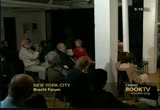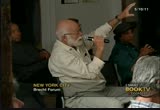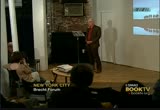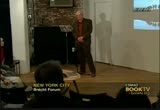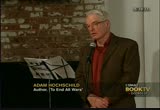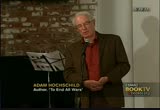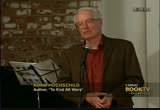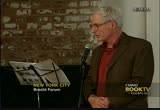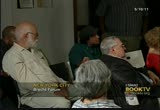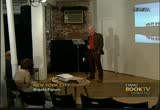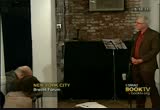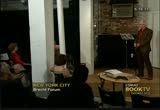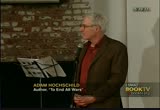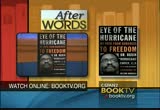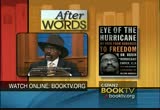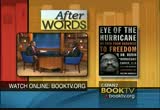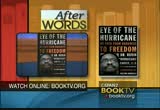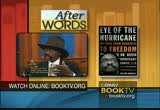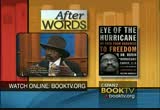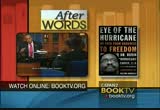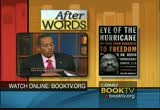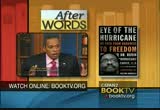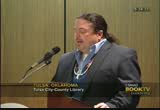tv Book TV CSPAN July 4, 2011 10:30pm-12:00am EDT
10:30 pm
10:32 pm
it was a war of multiple illusions. the first illusion was that it would be over quickly and easily. these are berlin students marching off to enlist in 1914. here are german soldiers climbing into a railway car and if you look closely what is written on the car is, to paris. hearer french troops marching off with equal enthusiasm. also getting into trains and written on the side of their training is to berlin. and, here are russian troops
10:33 pm
celebrating in anticipation of an early and easy victory. and of course, those early and easy victories did not calm. there is a second illusion about the war. i think the best way i can express it is the illusion that you could go to war and the enemy, the other side, would not be shooting at you. how otherwise can you explain the fact that literally millions of french troops, the entire french infantry went into battle dress like this. think of what targets that made for sharpshooters whose bright red hats, bright red pants, bright blue jackets and they died by the hundreds of thousands, partly as a result of that. and they were not the only soldiers dressed that way. the austro-hungarian cavalry was
10:34 pm
also fond of bright red and right blue and in fact didn't abandon those uniforms until two years into the war. yet another illusion i think was that something like the calvary itself could play a role in this war. these are french calvary here. all the armies had them. indian calvary that the british brought all the way from india to the western front. the famous luan lancers from germany. maybe i could get a glass of water or a bottle of water or something, if there is one. when the germans invaded france in 1914, the they did so with eight calvary divisions, 40,004 -- horses and you can just imagine how little chance a massive calvary charge had with,
10:35 pm
you know in the age of modern weaponry. nonetheless everybody practice for the great calvary charges like this british soldier who was drilling here. they anticipated a war that would almost be like knights in armor, like adjusting competition. the idea ideal for -- thanks. the idea of war was very closely allied to images of sport like this. in fact, the first correspondent of the london daily mail sent to the front in 1914 was it sports editor. and of course when they try to do these masses calvary charges they come up against barbed wire, not to mention the machine gun. and of course these ended the days of masses -- massive
10:36 pm
calvary charges forever. as a result of those two weapons, the barb wire and the machine gun, the western front where most of the bloodshed to waste, was essentially frozen in place along that line. for more than three years. budging barely ever more than a few miles in each direction. the entire year of 1915 for example, the year which saw the allies mass -- launch several massive assaults. there were probably altogether more than 1 million casualties on the western front from both sides killed, wounded and missing. the allies gained exact rate eight square miles. and instead of these glorious calvary charges, they imagine they had found himself sliding in and absolutely devastated landscape, more than 700 million
10:37 pm
artillery shells and mortar rounds landed on the western front in france and belgium during their four and a half years of the war, and they left the land looking like this. soldiers found themselves living below ground in trenches, sharing space with corpses and with rats. they found themselves -- they found themselves very often fighting knee-deep in mud. and, they found themselves facing all kinds of horrifying new weapons that nobody had anticipated, like a flamethrower for example. and of course when one side invented a new weapon like this, the other side very quickly copied it. the same thing with poison gas. experience for the first time as the germans used it against the
10:38 pm
russians in 1914, and against the western allies the following year. and there were defenses improvised against it, hastily constructed and strangely looking gas masks, but nonetheless, hundreds of thousands of people were injured by gas. some of them blinded, like these british soldiers in this particular photo. enormous numbers of soldiers were wounded in other ways as well. all you have to do is sort of imagine just one of these soldiers and then multiply that i 21000000, which was the number of soldiers who were wounded in the war. a tremendous toll of the war in dead and wounded gave us a foundling darker and more cynical view of the world that
10:39 pm
in many ways has stuck have stuck with us ever since. this cartoon appeared during the war itself, and this attitude of sort of a greater cynicism about human nature in general i think continued ever since then. now, there was another thing about this war that was very different from the wars for example that we are engaged in today. these are officer cadets at britain's most exclusive private school drilling in 1915. now, one of the things about the wars that we have gotten accustomed to in this country in recent years, vietnam, iraq, and the stand is that they are fox mostly by the poor. they are are very very few among the dead and wounded in those three wars who have been sons or daughters off ceos, senators,
10:40 pm
members of congress, anything like that. it was the exact opposite and the first world war. the death toll actually fell proportionately higher on the upper classes. and the main reason for that was that it was customary for sons of the upper classes, sons of the aristocracy, to have military careers. and i think a major reason for this is that armies are not only there to fight wars against other countries. they are there to maintain order at home. the 19th century was a very tumultuous time in europe, so was the early 20th century. many of the european armies were used to break strikes or the british army you know, put down tenant farmer rebellions in ireland, and so therefore officer in the army was something that was generally reserved for people in the upper
10:41 pm
classes. this meant i'd do when these countries went to war in 1914, these upper classes suffered an enormous toll. for example, more than 30 graduates of eaton were killed in a single day the first day of the battle of the psalm in 1916. menu graduated from oxford in 1913, 31% were killed by the end of the war. a few sort of specific examples, hatfield house, one of the great group british palatial country estates. queen elizabeth the first spent part of her childhood on this is day. it was along the seed of the aristocratic vessel family. the patriarch of that family, lord salisbury, was prime minister of england for some years at the turn of the century. he had 10 grandsons.
10:42 pm
five of them were killed in the war. and one of them, george sasso, is a character in this book. a german does toll among the children of clinical and military leaders. prime minister herbert asquith of england lost a son. so did his counterpart, chancellor of germany, the bettman hold the. the man in the middle of this picture, general sir herbert lawrence who was chief of staff of the british army on the western front, lost two sons. his counterpart in the french army, general know well but has to, lost three sons. so part of what i wanted to explore in this book was the mentality of such men. how could these generals, these prime ministers, these cabinet ministers, year after year, send
10:43 pm
their own sons into battle, their own sons charging out of trenches into the face of machine gun fire? and into a hail of fire that lasted a week after week, month after month, year after year for four and a half years. so that was something that i really wanted to explore in the book. now, the very insanity of this war made me equally interested in another type of person. those people and they existed on both sides in all of the warring countries, who recognized from the beginning that this war was madness, that it was not worth fighting. people like eugene v. debs for example the great american socialist leader spoke out loudly, repeatedly against the war. was sent to prison by woodrow wilson's administration and while still in prison, long
10:44 pm
after the war ended in 1920, he received nearly a million votes for president on the socialist ticket. another american dissenter was the social work pioneer, jane addams. emma goldman, anarchist leader, also went to prison for her opposition to the war. more than 500 american conscientious objectors were jailed during the war like these two men at fort riley, arkansas. in germany, the great radical rosa luxemburg went to prison for her opinions. in france, a staunch opponent of the war, which he saw coming and spoke out repeatedly as he saw a drawing closer was the socialist leader jean jurist who is assassinated by a right wing -- right wing nationalist three years before the war began. in england, the country's leading philosopher bertrand
10:45 pm
russell was to my mind the most eloquent of all the war opponents. and i think what i like about russell so much is that he was so honest about the conflict in his own feelings. but he read you something where he describes his state of mind as the war began. he describes himself very poignantly as being quote tortured by the patriotism. i desired the defeat of germany as ardently as any retired colonel. angwin is very nearly the strongest emotion i possess and then appearing to senate decided such a moment i was making a very difficult pronunciation, but as a lover of truth, the national propaganda of all the belligerent nations second me recollect a lover of civilization, the return to barbarism appalled me. as a man of afforded parental feeling the massacre of the young runs in my heart.
10:46 pm
russell spent six months in prison for his opinions. someone else who also went to jail for six months was britain's greatest investigative journalist, edmund d. morale. if any of you read my book, leopold's ghost you remember him as the man who exposed the brutalities of king leopold congo. and his german prison was extremely harsh. it broke his health, and he died not long afterwards really as a result. a very brave man. in all these countries, all the different countries, war opponents like this were up against an unceasing barrage of propaganda. here is is the u.s. army recruiting poster from the period. typical of the kinds of things once on both sides. a german poster, with god for king and fatherland.
10:47 pm
a poster warning against for heavens sakes heaven sakes of potential german invasion of australia. some of the pro-war propaganda had an edge to it. you know, he would be letting down the women if you didn't fight. perhaps you were you know, a wimp if aiding a responsibility. and worse yet, if you refuse to fight you wear may be a -- effeminate. so there was a real nasty edge to the patriotic fervor that was in the air. now as i mentioned, there were war resisters in all and all of the countries that were fighting. but for various reasons, the sharpest conflict between those who thought the war was a noble and necessary cause and those who thought it was absolute madness and not worth all these millions of lives to place in
10:48 pm
england. more than 20,000 men of military age refused to go into the british army. now, some of them accepted service, alternative service as conscientious objectors, which meant you could drive an ambulance or work in a war related industry like these men who were working at a quarry in scotland. but, many as a matter of principle refused alternative service as well. and they were sent to prison. more than 6000 young englishman went to prison during the war. the largest number of people up to that point in time ever in prison for political reasons in a western democracy. they served their sentences in places like wandsworth prison in the photograph here, in southwest london. those that you can see stretched across the opening there is to prevent people from committing
10:49 pm
suicide. prison conditions were extremely harsh. prisoners lived under what was called the rule of silence, where you were not allowed to talk to your fellow prisoners. they found ways around it of course, tapping on cell walls and whispering to people and whatnot, but they lived several years under those conditions. the diet with terrible. there was a shortage of coal. the prisons were very cold. many people died in prison. so, i was fascinated by these war resisters. for the longest time, i could not figure out how, from a storytelling point of view, i was going to get the resisters and the generals into the same boat. i didn't want to do just a series of portraits of one and a series of portraits of the others. and then, a clue came to me one day when i was reading a very
10:50 pm
boringly written scarlet we -- scholarly article about a well-known pacifist. she was an ardent opponent of the war, wrote the single best-selling piece of antiwar literature published in britain during the war, traveled up and down the country visiting conscientious objectors in prison, visiting their families, speaking out again and again against the war. some rallies where she spoke were shut down by the police. she was also involved in many many other radical causes of the day. a strong supporter of independence for ireland, for india. before the war she had been very active in the women's suffrage movement and had gone to prison for times. and in this article about her, the writer just made one passing comment, one sentence where he said, naturally these activities
10:51 pm
were deeply upsetting to her brother. and it gave his name. sir john french, which i immediately recognized recognized as commander-in-chief on the western front. so i thought that is going to be a relationship which fully interesting to write about. and indeed it was. because this brother and sister of diametrically opposite views were nonetheless personally quite close. she was eight years older than he was. he was her beloved little brother. she taught him the alphabet when he was small. they were banned in touch throughout the war. they saw each other frequently. they stopped speaking to each other only when, in 1918, the british government sent him to ireland to be viceroy of ireland in charge of suppressing the nationalist revolt against english rule. she went to ireland to work for the i.r.a.. they stopped speaking at that
10:52 pm
point. but, that gave me the idea of talking about the war sort of portraying this conflict train those who believed in it and those who didn't are looking at divided families. and of course there are some echoes in our own time because the vietnam era, the question of the vietnam war was something that divided many many families in this country. so i went looking for other divided families in the britain of that time and i found some. one was a family which i am sure some of you know. the famous pankhurst family of the british women's suffrage movement. emily, the mother, shown under arrest here prior to the war and her two daughters were leaders of the most militant wing of the british women's suffrage movement. on the eve of the war, emily
10:53 pm
pankhurst was arrested for literally throwing a rock through the window of 10 downing street, the prime minister's residence. and at the time the first shots of the war were fired she was a fugitive from british justice living overseas. the moment the war began, she ceased all for political activity, came back to england, put herself that the service of the british government, which dispatched her on speaking tours throughout england and to the united states and in fact in early 1917 center to russia to rally russian women to the war effort. meanwhile, her daughter sylvia pankhurst, worked very closely with her mother before the war, became an ardent opponent of the war, published the leading antiwar periodical and britain throughout the conflict. several of its issues were suppressed by the government. and was a very very strong voice
10:54 pm
for peace for ending the conflict. sylvia was also having a secret affair with cure hardy, the founder of the independent labour party, a predecessor of today's labour party and also an extremely strong opponent of the war, who was absolutely crushed when it began and died a think as much of grief over that as anything else in 1915. another divided families that i followed was the hobhouse family. one member, emily hobhouse, was an outspoken pacifist, who did something quite remarkable. in 1916, she traveled without government or mission, without prosser -- cropper passport and visa and so forth, traveled from britain through france and
10:55 pm
switzerland to germany. she went to see the german foreign minister whom she had known before the war, talked about possible peace terms, asked him what might we terms in which germany would agree to peace. talk to other people in the german government. went back to england. saw people in the british government. tried to suggest these terms to them. diplomacy that failed. but, over the course of four and a half years, the worst conflict the world had yet seen that had left 20 million dead, she was the only person in europe who literally traveled from one side to the other in search of peace. she had great influence on a the young cousin of hers, stephen hobhouse. in this picture he is much older but during the war he was a military age. he refused the draft, was sent
10:56 pm
to prison and in prison was thrown into solitary confinement because he was leading a protest against this rule of silence. he said i'm going to speak to my fellow human beings whether they are fellow prisoners or guards whenever i feel like it. no one can stop me and they threw him in solitary. he had three brothers in uniform. two of them were at the front. one of those at the front was later killed, but before he was killed, he sent a message back to their parents telling them, tell stephen not to lose heart. a very interesting relationship. just to make things more complicated, a very close friend of the family who had actually acted as godfather at stevens baptism, and man named alfred wilner, was the minister of war. now, there are various other
10:57 pm
characters in this book as well. some of them are people you know. such as the writer rudyard kipling who was of course a tremendous drum beater for this war as he was for every war that reagan was ever engaged in. he cultivated a love of things military in his son john kipling, about four years old in this picture with a rifle. john kipling with his father fathers encouragement set his sights early on a military career. he had great trouble getting into first the navy and then the army. he kept getting rejected because he had inherited his father's bad eye sight. you how when you see teachers are greater kipling he always has these very thick lasses on. finally his father told strings, went to a field marshal they know, got john a commission as an army officer. and in 1915, john kipling went
10:58 pm
into action at the battle of loose and was never seen again. his father of course was completely devastated. sum of the other characters in this book i think that people who will be less familiar. one of them was a man named leonard brockway, editor of the socialist newspaper before the war. went to prison as a resistor and in prison, he continued to be a newspaper editor putting out a clandestine newspaper for his fellow prisoners on toilet paper. it was published regularly, twice a week for a year and tell the authorities discovered it and punished him by putting him on a restricted diet and solitary confinement. and incidentally copies copies of somebody's clandestine newspapers, there were a number of them that survived. another character in the book, one of my favorites, a man named john s. clark. he was born into a circus
10:59 pm
family, grew up in the circus. when he was 17 years old, he went into the ring, the youngest lion tamer in great written. subsequently he got involved in radical politics. when the war broke out he was tipped off by a friendly policeman that he was about to be arrested. he went underground and throughout the war was the editor and a writer for a socialist antiwar newspaper that the authorities kept trying to suppress that they could never find where it was being published. after the war, he came back above ground again and was a labour party member of parliament for a while and then spent many years on the glasgow city council. when the circus came to town he went back into the ring and was the oldest lion tamer in great britain. the war that people like this
11:00 pm
resisted and protested against caused absolutely unprecedented suffering. it left huge cities destroyed in a way that europe had never known before. these are the rulings of the 15th century cathedral in belgium. there were so many soldiers killed that by the end of the war, england was strapping 17 -- 17-year-olds and germany was taking soldiers into the army, who were still younger. ..
11:01 pm
of course the man on the far right in this picture with his world war one german army unit played a crucial role. and 20 years later he would lead the world into an even more destructive war and the holocaust to boot. so, my help in writing this book is that when we think back on the first world war we will remember and not just the politicians and not just the generals, but some of those who tried to stop the bloodshed even though they were in vain, including some of the people in this book.
11:02 pm
now, i'm going to and by playing you some music, and let me explain where it comes from. it is a song that some of you may know, the green fields of france composed by the scottish songwriter eric beau will. he was inspired to write it when he finished -- visited one of the vast, vast military graveyards, and there are hundreds upon hundreds of them that spread across the area of the old western front in northern france and belgium. he noticed the name of an irish soldier on one of these tombstones and the song is addressed to him, here by john mcdermott. while the song is playing, i'm going to show you some old vintage newsreel footage from the first world war. but i want you to listen to the words of the song.
11:03 pm
can you start? ♪ >> well, how do you do. do you mind the advice? and rest for awhile under the warm summer sun. i have been watching all day and time nearly done. i see by your gravestone you were only 19 when you joined the great father in 1916. i hope you died well, and i hope you died fitting. i yearn mcbride. >> did they beat the drum
11:04 pm
slowly, did they play the pipes slowly? did they in march as they lowered you down? did the band play? did the pipe play? did you lead a life or a sweetheart behind? some say. although you died in 1916 in that day are you for every 19. but strangers without even a name. close them forever behind the glass frame.
11:05 pm
in an old clothes and ramp toward summer. the yellow, the brown leather plane. did they beat the drums slowly? did they play? did they hum the march as they lowered you down? did the band play? did the pipes play? ♪ the sun now it shines on the green field of france. the warm summer breeze. and look how the suns shines
11:06 pm
from under the clouds. there's no guns firing down. but here in this graveyard it's still no man's land. then me in the sand. demand and difference. the whole generation that were butchered and then. did they beat the drums slowly. did they play the pipes slowly? did they hummed the death march as they lowered you down? did the band play the land post and chorus? ♪
11:07 pm
i can't help wonder why. to those that died here know why that they died? did they believe when they entered that they really believe to that this war would end wars? for this suffering, the glory, the pain, the fighting was all done in vain. then mcbride, it all happened. and again and again and again and again. did they beat the drums slowly? did they play the pipes slowly? did they hounded death marches they lowered you down?
11:08 pm
11:09 pm
hear them. [applause] [applause] all right. [inaudible] >> aside from these articulate and brave and well-connected individuals who oppose the war it will also, large parties that claimed that they would reject this in the name of international solidarity with the working people. were they just quickly swept away in the patriotic enthusiasm? >> well, all of the left-wing parties were divided.
11:10 pm
really all of britain, germany, other countries, there were real divisions in the socialist party's there. you know, in britain the bulk of the independent labor party, most important of these parties stuck with its leader in his stand against the war, but many other members of the labor coalition and parliament went over to the government side. party there which was, by far, the largest and most powerful socialist party in europe, they had something like 30, 35 percent of the vote in germany. powerful newspapers, other institutions. they provided, and there were a small number, i think about a dozen of the hundred and 20 or hundred and 30 socialist deputies who voted against extending work credits, which the kaiser had asked for on the
11:11 pm
eve of the war. the tragedy that one feels looking at this is that i think all of these people, you know, initially before the war had the right ideals. they felt that it was much more important to feel solidarity with your fellow human beings, with your fellow human beings on the left to were struggling for great social changes then it was to feel allegiance to the nation state. once the war began, the lure of tribalism, the powerful, powerful drive that people seem to have with them and that we all have somewhere within us proved to be more powerful. amazingly there was a demonstration against the coming war of 100,000 people in berlin just four days before the first shots were actually fired.
11:12 pm
but after the first shots were fired, even the german peace society issued a statement in favor of the war, as did a huge number of intellectuals, even those on the left. russia signed a pro were statement. the only way i can explain it is that the allure of tribalism is a very, very powerful thing. it is still very much with us. i mean, will look clock back, you know, a week or two ago. we were all, you know, probably glad to see the end of osama bin laden, but it made me feel very creepy to see is people out in front of the white house shutting. -- shouting. wait for the microphone. they have to bring the mike around.
11:13 pm
>> i'd like to talk. >> speak up police. -- please. >> yes. i was listening to you. i mean, i like your presentation . i liked your intimate on obsession. at the same time i was thinking as you were presenting, the people, he writes about the persistence of the regime. the thing that kind of resonates with you and resonates with those who argue that the
11:14 pm
aristocrats who ruled until 1914, fair enough. all of that is fine. i can say one has to create the mass participation of people in the first world war. the triumph of nationalism. that's one thing. the very triumph of nationalism may be positioned against the failure or the frustration of was the other altman in the late 19th century and early 19th century. it's one reason why also i would argue that the production of the 1917 russian revolution did not to really succeed in its internationalist and.
11:15 pm
that did not triumph. it was in large reason because there was no support for the party for the war. especially in terms of the nationalist. more than tribalism. >> well, certainly the story of the first world war and so many other wars before and sense is one of the triumph of nationalism over reason, over its human solidarity and over much else. you are right to rent -- mentioned the russian revolution which in many ways was a direct result of the first world war. by the time of the revolution russia had suffered some 6 million casualties, dead, wounded, prisoners, and missing. during the year in 1917 it's estimated that more than a million russian soldiers left the front and what tom which is telling you know, what we would
11:16 pm
wish people to do in all wars at all times. the russian revolution even though fairly quickly went awry in horrible ways nonetheless when it happened in 1917 was greeted with tremendous enthusiasm by the anti-war leftist in the other countries. it is very moving to read the accounts, for example, of the british war resisters in prison as they get the news from russia. they were all convinced and hopeful that this was the beginning and would be a revolution that would spread to other countries. but it did not end the war went on. bring the microphone. out, you have the microphone. okay. >> of the brief, and i've regretted not hear everything you said. considering the libraries full of books about the first world war that now exists, access to
11:17 pm
so many documents that we did not have access to at the time of the war right after, with lowlands of historical hindsight do you think that the war was inevitable? did it have somehow been presented to five prevented? the inevitability. in other words, i'm asking you that if you think in the end there were right that the war was the logical culmination? consider how calamitous it was. the images he showed us are almost beyond comprehension. a whole generation swept away. cemeteries in belgium and so on and so on. when nurses the hope somewhere that such a thing could have been prevented. i just wanted to know your take. >> it is a good question.
11:18 pm
i actually think that the war was not inevitable. you know, this is one of those things that historians argue over endlessly, of course. it was inevitable because surely there worsen tensions in europe. there was a naval arms race between britain and germany, for example. but we had 40 or 50 years of an arms race between the you arduous there were, as of mid june 1914, no outstanding boundary disputes, no country planned part of another territory. there was some imperial rivalry, but we have a lot of them. rivalry in the world right now between the united states and china and all sorts of other ways. there was imperial rivalry in africa, but the european countries effectively divided up
11:19 pm
africa among themselves some years previously. once the war began then, of course, all the imperial rivalries came to the surface and in africa britain and france on one side in germany on the other were very negatively fighting to seize control of each other's colonies knowing that to the victor would go the spoils. but despite the tension, i do not think the war was inevitable. >> you did talk more than a little bit about american anti-war feeling. what about that? i know that the american left was split between the less radical. lenin. russia dropped out of the war as soon as the rest of the nation seceded. i know that some people like karl sanford, for a sample, the
11:20 pm
u.s. socialist party because it would support the work. some people on the left fell patriotically that we should be. would the speaker whether? >> i don't know as much about the war movement in america as a shed. and this book of focus entirely on england. i just want to tell the story within one country because it was there the week were the most active anti-war movement. there are ones that i mentioned debs, goldman, and many others.
11:21 pm
many on the left, carl sandberg leaving the socialist party you felt that, yes, it was a war against democracy and to believe that there was, when you said we were fighting for democracy. the anti-war folks to i sympathize with much more said it is a mockery to say that this was a war against democracy when britain, france, and the united states were alive -- aligned with russia. russia was the last absolute monarchy in europe. i think, you know, that just brings out how countries when they go to work always claimed to be fighting for the most noble of ideals. they never say they are fighting for their economic self-interest. the only claim no ideas. it behoove us all of us who live in a time of war, as we do right
11:22 pm
now, to question that rhetoric very, very closely. >> you mentioned to phenomenon that seem to be closely related. i don't know how. one is tribalism, and i would like you to explain what you mean. the other is, and you know, amnesia. he did not mention it. the war to end all wars. but part of the power and the shock of these images is they are part of our history. they're not part of children's history books or the history books in high school. how does, you know, -- what is tribalism, and how does it combined with repression of war to create an appetite for war? >> good question, and i'm not sure i know the answer to it.
11:23 pm
i just know that it is a very, very powerful force in history. it is the tendency to want to identify with a group that you can feel a part of. one sees it again and again. i think there is something of tribalism in the fanatical way that people sometimes refer sports teams. we are looking for something to identify with. that's us. that's me. i'm part of this group. why do we feel it as much when we identify or large number of people feel it when we identify with the peace movement or the socialist movement are something like this? i don't know the answer to that. it's something have puzzled over for a long time. i think and so we can figure out
11:24 pm
the answer to that or not going to get very far. you know, i do think that there are -- i'm interested by developments that seem to begin to supersede tribalism in some areas. now, i think for many people on the left the european union has a bad name because it represents the rich countries of the world and the countries of europe who were acting in their own interest and imposing trade terms of the poor countries and so forth. nonetheless i think one can't help but feel something when you go to europe, our will to cross borders with no customs officials, see that people have passed words that i the same except the name of the country appears only in small letters. that is the start toward
11:25 pm
something. i'm still waiting for the world passport, and we're not there yet. >> thanks for your presentation. i was wondering if you could touch a little bit more on the presentation. world war i as the birth of the public-relations industry. a lot has been made of the shift between world war two to the vietnam war here at home in terms of the way that american soldiers have to be hammered that killing was not necessarily wrong, especially killing unarmed soldiers, enemy soldiers. of course licking and world war one this really is the birth of all of that. i'm wondering if you could touch a bit upon what he's doing. >> i am glad you asked that. this is a big subject in my book. one of the things that interests me very deeply was that in addition to being the first war
11:26 pm
to have destructiveness that this technological level, the first world war was really the pursed propaganda war. why? because up to that point in time in europe and the preceding several decades all the wars have been small-scale colonial conflicts where small volunteer armies, you know, germans, frenchmen, and was men went out and put down colonial rebellions in africa, asia, concord new colonies. it did not require a propaganda effort. you know, certain riders like rudyard kipling to be counted on for supply of the proper kind of poetry and story telling and so forth. there wasn't anything organized by the government by the government. right from the beginning they seem to realize that this war was going to require a massive propaganda effort. this was especially true of england, and it was another
11:27 pm
reason that led me to concentrate on england in this book. alone of the major powers in europe britain did not have conscription. they had still an all volunteer army. so whipping up the necessary enthusiasm, they had to whip up enthusiasm in order to get millions of men to analyst. in fact they did get two and a half million men to enlist before they impose conscription. how did they do it? it began very early with cabinet minister. only about six weeks into the war. symbols, began with the symbol, more than 50 of the country's leading writers. very familiar names. james berry, h. g. wells. many other people, all the prominent british writers with rare exceptions. in a meeting in a commercial office, insurance company office
11:28 pm
in london and said we want you to write for the war effort. whatever you right we will see that it's published. and for the next four plus years there was a huge brush of fiction, non-fiction, pamphlets, books, magazines, almost all of it ostensibly coming from commercial publishers but, in fact, they agreed in advance to buy 50,000 copies of this and hundred thousand copies of that. they produced posters, some of which i showed you. they produced postcards. they produced a german atrocities calendar with a different atrocity for every month of the year. it was as a huge operation. they sent people on lecture tours. they set up organizations. every part of this propaganda operation was ted do with the
11:29 pm
united states. he has states came in on the allied side which eventually the u.s. did in the mid 1917. up to that point in time there was a lot of propaganda directed toward the united states. every catholic priest in america, for example, received a regular letter from a patriotic association pamphlet. it had all been set up an orchestrated by the government. all kinds of things of that sort. in fact, they even pioneered what today we would call astroturf where there is a sort of citizens organization that is set of to, you know, further somebody else. for example, although most of the movement did end up supporting the government war
11:30 pm
effort people in the government were still distressed, but there was a significant percentage of union members, hard to say how many, 15, 20 percent may be who really did not think well of the war and did not rush to analysts. suddenly and mysteriously in 1916 there appeared an organization called the british national workers league which began organizing rallies all over the country, organized 100 rallies. they published a very handsome looking weekly news magazine. they were hailed by the london times as the authentic voice of the working class. they declared themselves sort of vaguely in favor of better wages and benefits but most importantly we have to win the war first. scenes by the guy whose picture a share issue of one.
11:31 pm
11:32 pm
>> any time there was a small anti-war meeting, there was a scotland shorthand writer writing down everything that was said and transcribing it. all of the material is in the national archive. some of it has only become available in the last decade or so. somebody who finally under the u.s. freedom of information act managed to get my own fbi files. i found it fascinating to look at how scotland watched that time. what? got to wait for the mike. >> i have two questions. the first was why was barb wire such an important innovation. the second, the footage you showed at the end, i assume it went shown contemporaneously.
11:33 pm
>> barb wire had been invented by a cattle farmer in the late 1800s. it was tremendously important because it was really the greatest defensive weapon of all time. you string a big tangle and it takes people, you know, however hours to cut their way through. it was virtually impentable from the explosive devices and tanks were the only thing that could go over the wire. the footage of the body being buried i would be virtually positive it was not shown at the time. think i you are right. i don't know that for certain. because the place where i got this film footage from has sketchy sourcing. one doesn't know.
11:34 pm
you have to be careful any time you look at documentaries. using old footage. some of is is staged. because the british government and the german government went to great lengths to make propaganda films that showed combat. and they are a mixture of real footage, and i think all of what i showed you was real and then sometimes in these scenes, you see things which are obviously staged where there are men charging over the top of a trench and bagpiper strolling back and forth. >> in terms of the current situation, one the lessons of the vietnam political leadership in this country was that the draft was a great obstacle to the independent of the political leadership to wage war when it
11:35 pm
chose to do so. as a result of this, we do not have the draft. the draft really encouraged -- once the draft was extended during vietnam, it encouraged others and others of america to rise up and say, no, no, we won't go. it brought the war to a quicker conclusion. and the current situation, however, post 1974, i think it is, when we eliminated the draft in this country, we know have given greater independence to the political leadership. democrat or republic to pursue in the more limited sense. not in the mass war sense, but in the limited sense to pursue limited wars without a draft. which really has made the limited war more possible as a tool of the american policy, free from political pressures against. and in a certain way, we move beyond your notion of war as the great voluntary enthusiasm of
11:36 pm
1914. we have arrived at a more limited and more refined method where we can run one or two small wars and most of us won't know, don't care, because our own children don't go and will not be affected. whereas your argument is that when all of the children were asked in 1914, they still let it go on. however, we don't face that same problem. we've been purr if id a bit. >> i think you are right. you said it eloquently. certainly the existence of the draft did help bring the anti-war movement into being here. you know, i think it was a major thing that led to the u.s. withdrawal. obviously the biggest thing of all was the resistance of the vietnamese. certainly the anti-war movement here was a big part of it. mcgeorge bundy in 1968, we
11:37 pm
have to find a way out of this because the price at home was too high. that was because of the anti-war movement. now we no longer have the draft. i peer we also have something else which is the government believes it can wage war in the high-tech ways with drones and so on. where there are no american soldiers at risk. and that also, i think, is something that even if we still had the draft might slow an anti-war movement from bringing into -- coming into being. but how to bring that anti-war movement into being in these changeed circumstances is the big question facing us which we have not solved in any way. >> adam, at the beginning of your talk, you mentioned the illusions that help create the war. you didn't mention the title of your book. which i think is probably the greatest illusion. could you say a little bit about
11:38 pm
why you called the book that? and what the thinking was behind that notion? >> well, the phrase requests this is the war to end all wars" by wilson. although a couple of people say he never uttered the wars. nonetheless, that was the thought. he'd be elected to office in 1916 on the platform of keeping the united states out of war. but then the following year, the u.s. did go to war. and, you know, because the war was so large, and so terrible, people had to be told this was going to be the last one. that was going to be the war to end all wars. of course, it wasn't. particularly the way the war came to an end and the peace settlement. alfred milner, a bad guy in my book, nonetheless, was smart
11:39 pm
enough to see the piece settlement and the onerous terms, were as he called it the piece to end all piece. indeed, that's what it turned out to be. >> yeah, i was wondering if all of the planning for the war, the propaganda director and all of that. if you were asked about it, how many people actually -- quite a bit of room. how many people made the decision to go to war. how many deciders were there? >> boy, that's a complicated question. because there are different deciders in different countries. and historians have spent lot of time studying those six weeks again the assassinations of sierra navo and the assassinations of war. i think there were key chemo. if they were not quite so
11:40 pm
bellicose, the war might have been averted. part of the problem was the way things were set up in europe. there were two things that made the downward slide into immense conflict inevitable. once it began, once was the system of rival alliances where there are countries committed to come to each other's aid if one country was drawn into the conflict. france and russia, germany, russia, hungary. the other thing in 1914, all of the countries had fairly small standing armies, but enormous armies of reservist. people who had been trained but had to be mobilized. and it took several weeks to be fully mobilize your army. get all of the reservist off of the farms and into the factories and into uniforms, you know, reunited with their rifles off to the front.
11:41 pm
if you could start mobilizing your army before the other guy, you had an advantage. similarly, if you could attack first, that meant the war would be on the other nation's territory. that's what germany and austria hungary did. these were things that sort of accelerated that spread. if we were able to rewrite history at will, so that things could unfold in the way that i said a moment ago, that i, you know, i think the war was not inevitable. i would have -- you know, changed the actions of kaiser wilhelm and i think then the war might not have happened. not there wouldn't have been other warms in europe later on. i don't think it would have happened in quite the same way. you know, a few more people have questions. i'm wondering whether or not we ought to, you know -- all right.
11:42 pm
how about one last question? then i'll be glad to keep on walking with people that want to stay for a little bit afterwards. >> you are a very nice guy. i like you. but -- >> but. >> but, i think you are wrong in two senses. one is the sense in which nationalism was a very strong sport in the late 19th century. without it, socialism can't be unpopularred. the other is the context of propaganda. propaganda and prescription. they are not novice at all. prescription was in the napoleonic war. it was conscription. and through what? inexchange for citizenship.
11:43 pm
nationalism, conscription, citizenship, propaganda. what better could napoleon produce to overthrow all of the monarchies in continental europe? neither propaganda nor prescription are -- and the industrialization of war. the industrialization of war that really begins in the late 1880s. very crucial to understand. not from any case from the nature of your presentation and the substance of it. i'm very grateful and thankful. >> i certainly didn't mean to imply that conscription was something new. it had exhibited before in the american civil war here. and the british navy had
11:44 pm
conscripted people. rounding young men at the courts. that was not new. nor was propaganda new. but i do feel that the propaganda reached a level of sophistication. a multipolice si of media that had not been known before. some of the media, of course, were not known before. film, radio and so on. but the termination, widespreadness, the orchestration by the government, the bringing in, you know, for example, of all of the countries leading writers and enlisting them. nothing quite like that had been done. although propaganda has been done before. >> one more question. all right. one small question. then that's it. >> yeah, i just wanted to -- this hit me like a lightning bolt. i was wondering, i really appreciate your presence. i really appreciate your books, by the way. my question is about the heroic in the war.
11:45 pm
because of something you said about the calvary and the charging. it seems to me that world war i initiated the end of the heroic in the war. you know, from that point on, war became more distant. then from world war ii, up to the fact that now we're talking about like the iraq invasions and we're talking about like a video game. i was wondering in terms of the literary or even like a level, and in particular to the literary writers as well, would you consider world war i to be like the end of the personalization of war? in terms of the way in which people fight. >> i think in many ways, it was. i mean there was sort of a gradual progression towards that. obviously, if you go back to the days of nights in armour and when people fought only with swords, you know, if you were a better swordsman than the other
11:46 pm
guy, you prevailed. i think this is one the romantic images associated with combat. as soon as the rifle and especially the, you know, long range repeating rifle came into being, that reduced the guarantee that if you were a better swordsman or marksman or something from the other guy, you would prevail. because somebody would kill you from a great distance. in the first world war, that inability of ones own ability as a soldier to have anything to do with whether you survived or not was so extreme and a way never known before. because most people actually who were killed and injured were not killed by machine gunfire, but by artillery shells, which, you know, burst into shrapnel and scattered hundreds of pieces in our directions. these were fires from several miles away.
11:47 pm
didn't matter how heroic or unheroic you looked or were charging across the battlefield, you were killed by something that was fired by somebody that you couldn't even see. in that sense, this war was very modern. and that is with our even more today. so thank you very much. >> is there a nonfiction author or book you'd like to see featured on booktv? send us an e-mail at booktv@c-span.org. >> your book is called "eye of the hurricane: my path from darkness to freedom" with a forward by nelson mandela. >> that is correct. >> let me read to you, you say here my main purpose in writing
11:48 pm
this book is to share with you that i have discovered the truth. >> to being the truth. >> well, it says -- yeah. but the love of truth is the spirit of man. given where i was, and for how long i was there, this is incredible, i have no business at all being here now. >> that is absolutely correct. >> now you say that you were in jail 40 something years. what do you mean by that? >> well, i was in jail 47 years -- the fact that we are born into a primitive, actually, we are born that perfect being. perfect being complete with all of our possibilities in tact. but we're also born into a world of sleeping people. the level of unconscious human insanity where hate and war and death and destruction and inequality reign supreme.
11:49 pm
we are born into a prison. so i was in the -- i was in that prison for the first 40 years of my life. until i was able to wake up and get out of that prison. and realize who i really am. >> well, let's come to who you really are in a second. let's just for the viewers sake say that you were actually incarcerated in prison for about 20 years. 1964 or '65? >> 1966 to '85. >> '66 to '85. the charge was having murdered three people and wounded one in a bar. >> yes, it's just not -- just not having murdered somebody. i mean to be accused of murder is bad enough. but to be accused of being a racist murder is doubly bad. that's what i was accused of being. a triple racist murdered. >> racist? why? >> because all white people had killed. >> this was a charge that had
11:50 pm
you targeted them because of their race? >> because of the race. because a black bartender had been killed by a white man in another part of town that night. they thought this was a racial avenge motive. you also have to realize those times -- at that time in 1966, these are early '60s when the country was still segregated. you know, when black folk weren't allowed to eat in restaurants or go to school or ride on certain parts of the buses or drink out of the water fountain or even have equal boating rights at the time. that was what was going on in this country at that time. which was a terrible thing. and so that is what i was accused of being. a triple racist murdered. >> and in the book, you write about growing up in a household that really was violent and difficult, facing your father across the living room with
11:51 pm
shotguns. >> yeah, my -- my family life was not violent. the violence was outside of the family life. but you got to realize that in may, this may, i will be 74 years old. and so my mother and family come from a generation where they taught that if you -- if a child put his hands on his parents or even threatened his participants, since they brought you into this world, they will take you out of this world as well. that was the type of society that i grew up in. >> describe to the peopling watching why you would be facing your father with a shotgun and he with a shotgun facing you? >> well, because i was a very angry young man at the time. very angry. and i confronted my brother, my brother james who was a highly successful academic. i mean he was going to harvard, he was one of the youngest to
11:52 pm
graduate from harvard with a phd. he later became the superintendent of school was boston, you know? and i was in and out of reformatory in my out of my youth. my father to sort of choose between which one he's going to support. i confronted my brother because when i came home from the military in 1956, i heard that my brother was hanging out with homosexuals. you know, that he had known kno- all of these folks used to dress up like halloween on women. now he was home from vacation. they were doing the same thing.
11:53 pm
i confronted my brother about that. we started to fight. i eat him up. that's when my father got involved in this. my father jumped me. i pushed him away. i said don't put his hands on me. i wouldn't allow anyone to put his hands on me in anger anymore. my father ran and got his shotgun and i got mine. this is the same thing that happened to marvin gay and his father. killed him. had it not been for my mother, my father would have killed me as well. >> your mother intervened, and said get out of here. >> absolutely. get away. >> what's interesting, you described yourself at technically as having been in jail for 20 years. but the violence and the whole world of hatred, you said that's
11:54 pm
been a jail for 40 plus years, until you discovered yourself. let me read again from your book. this is an interesting moment. you say you are going to be 74. you're been in jail. i was a prize fighter, soldier, convict at one point, i was a jailhouse lawyer at one point. it says here, you were executive director of a group that was called association and defense of the wrongly convicted. today you are ceo of the innocence international group. >> yes. >> if i had choose to write an epitaph on my grave stone, it would simply read he was just enough. that became because somebody in the high school audience asked you who you'd want. now you are a man, bob dylan wrote a song about you.
11:55 pm
nelson mandela has written a forward to your book. i remember he loves boxing. >> he was a boxer himself. >> then he talks about someone like him in jail and has come out of it. here's nelson mandela, bob dylan, even tony bennett. >> muhammad ali. >> they have known you. you say for your epitaph, he was just enough to have the courage to stand stand up to his convics no matter what problem his action may have caused. he was just enough to escape the universal prison of sleep to remain the humanity in living hell. he was just enough. >> just enough. why when people hear this, just enough, i'm sure they are thinking just enough to get off? escape, survive, why not to make
11:56 pm
something bolder? >> universally, we are all just enough. we are all unierer sally just enough. we are born with everything that we need to wake up and become conscious. that is just enough. >> you can watch this and other programs online at booktv.org. we asked what are you reading this summer? here's what you had to say.
11:57 pm
11:58 pm
i'd like to start with a question from the first distinguished guest book. that's how american is miasmic. for susan, this question wasn't part of trivia pursue in any way, shape, or fashion. she was a cheerleader with a straight a average, she became a presidential scholar, was arrested an internship with the little of giant and she won a national merit scholarship to college and browned ms. oklahoma in 1971. i have a spoiler alert here. for those of you who haven't finished reading the book. she didn't win the title that year. but her performance called prominent attention to the lives of native people living the
11:59 pm
paradox and being marginalized as strangers in their homelands. this alienation is due by the decisions trendered by the courts. our next author is the author of in the courts. he analyzed ten cases that embody or expose the roots of injustice and the legal doctrines upon the legal, political property and cultural rights of indigenous people. while the judiciary rendered the native instruction of the native american identity and culture okay in many americans ideas, this offers more than a simple history. it presents a very compelling case for reform and american jurisprudence. taken today, you might think the themes of these two books are too tragic
220 Views
IN COLLECTIONS
CSPAN2 Television Archive
Television Archive  Television Archive News Search Service
Television Archive News Search Service 
Uploaded by TV Archive on

 Live Music Archive
Live Music Archive Librivox Free Audio
Librivox Free Audio Metropolitan Museum
Metropolitan Museum Cleveland Museum of Art
Cleveland Museum of Art Internet Arcade
Internet Arcade Console Living Room
Console Living Room Open Library
Open Library American Libraries
American Libraries TV News
TV News Understanding 9/11
Understanding 9/11